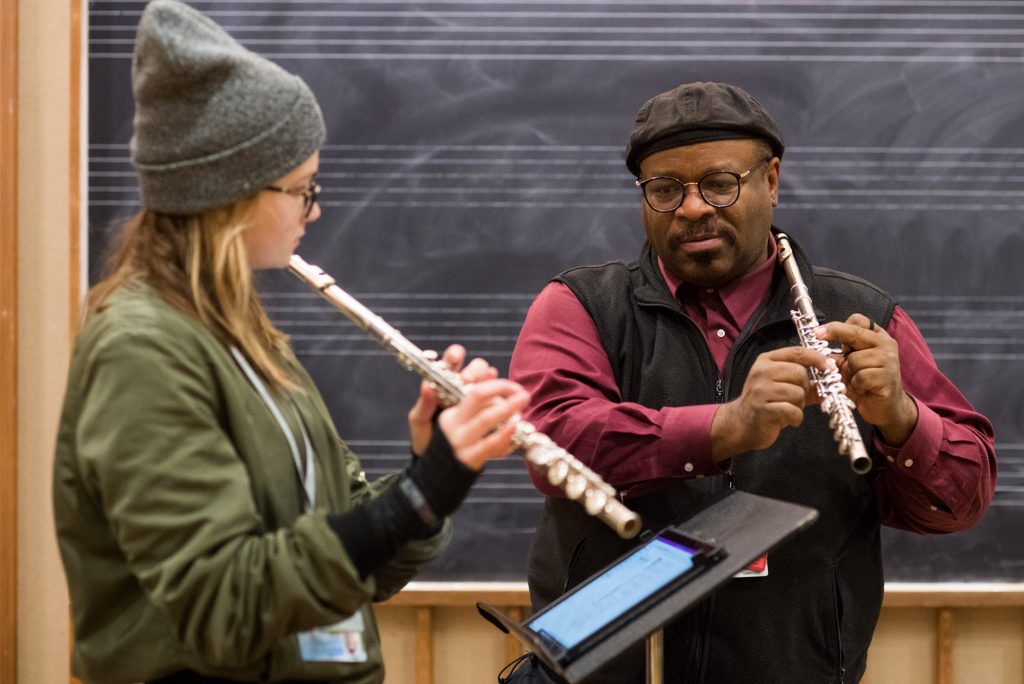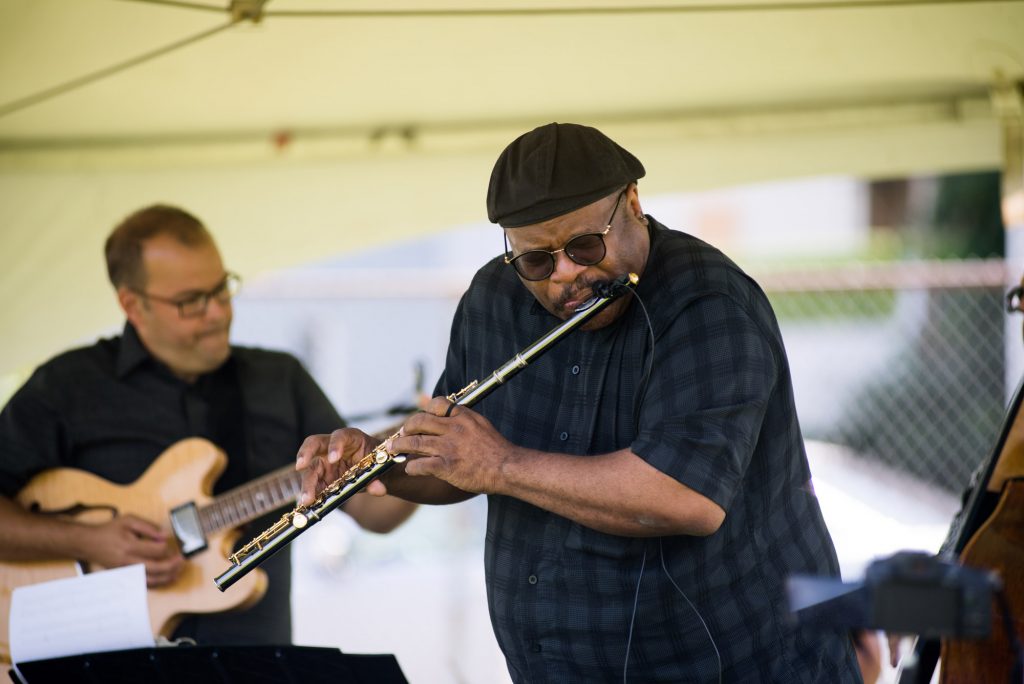Mild-mannered BU Employee by Day, Flute Ace by Night
By day, you might have to make an effort to find Lance Martin. He works behind the counter at the BU School of Medicine Diversity & Inclusion Office as the administrative assistant.
But on certain nights, you can step inside a place like Darryl’s Corner Bar & Kitchen on Columbus Avenue in Boston, and he’s hard to miss. He’s the guy in the beret and in the spotlight, throwing himself into a flute solo on a jazzy trio version of Beyoncé’s “Love on Top,” say, or something more traditional, like Cedar Walton’s “Bolivia.”
On Sunday mornings, you’re likely to find him at Twelfth Baptist Church in Dorchester, where he’s been playing at services and functions since 1980. And at other times, he’s out at Wellesley College, where he teaches flute improvisation to undergraduates raised mostly on classical music. And he has been playing more and more functions at BU’s Medical Campus.

Some people have side hustles. Martin has a whole side life—with the flute.
“I love the instrument,” he says. “It’s a pure instrument.”
Martin has developed a style he calls “physical jazz,” a style where, let’s say, it’s not hard to tell when he’s feeling the music, swaying and swinging, walking into the audience or even into the next room. “I can’t stand in one place,” he says. “It makes a different player out of me.” (Moving around is good for his sciatica, too.)
He leads a few different combos. The Lance Martin Jazz Trio includes guitar and bass, and they play all-request sets, consulting a digital “fake book” on his iPad when necessary. The night at Darryl’s, they also covered John Coltrane, Frank Sinatra, the Odd Couple TV theme, and even BU Today’s request for the Mamas & the Papas “California Dreamin.’”
“The all-request shows give us a chance to interpret. We play it our way,” he says. “I love the instrument because you can do so much with it.”
“I can’t stand in one place. It makes a different player out of me.”
—Lance Martin
That particular set list at Darryl’s, though, doesn’t quite do justice to the role of gospel in Martin’s music, and he’s as likely to break out in something by Kirk Franklin as a hit by Shaggy or a jazz standard. His father was a Baptist minister, the women in his family were all involved in the choir, and “when I started,” he says, “I would just play ‘Amazing Grace’ because that was the only song I knew.”
Is playing in church very different from playing a gig like Darryl’s? “Not really,” Martin says, “it’s just a different genre. Everything is about knowing your audience.”
As a boy in Pittsburgh, he fell in love with songs like Duke Ellington’s “Satin Doll” while listening to WAMO, then the big R&B and jazz radio station. “Then I found Gershwin and Rhapsody in Blue blew me away,” he says. He started going to the library to play records, including Boston Pops recordings of Gershwin. When he was seven, he found the flute.
“Musically, you can do a lot of things with it,” he says. “I found out because I used to stay in the basement and just play flute. I remember one Saturday my mother sent my brothers out looking for me because I was down there practicing from morning till night.”
He would listen to as many flute players as he could, and he even watched The Lawrence Welk Show just because there was a flute in the band.
As a teenager, Martin played, arranged, and even taught for a community youth orchestra, the Ozanam Strings, playing pieces from Gershwin to the “Theme from Shaft.” After high school, he studied at Berklee College of Music, where, he says, faculty member and tenor sax player Herman Johnson “taught me how to control the band while playing, communication-wise.” Johnson taught him how to tell the band to get into the solo section, to end the solo section, using just gestures and eye communication.

Church is probably the only place where Martin has played longer than at Cambridge’s late, lamented Ryles Jazz Club, where he gigged for 36 years before it closed in 2018. But his most memorable gig was at Boston Medical Center, he says, and it’s very much a case of him knowing his audience.
“My former boss, who’s in charge of the BU Medical Center Band, came in and asked me one day, ‘Do you have your flute with you?’ And I said, ‘I don’t carry my flute to work,’” Martin says, beginning to laugh. “And he said, ‘The reason why I’m asking, they asked me to play for a wedding at the hospital, and I don’t have my harmonica.’ And I said, ‘Well, I’ll do it if I can go home and get my flute,’ and he said OK.”
When he got back, he found a Latino couple waiting. The man was in a wheelchair and was going to hospice, and his last wish was to marry his fiancée. “There’s a song that’s an icebreaker, ‘Guantanamera,’” Martin says. “When I play it in hotels, the workers, Latino people, they come out from the kitchen, they come out from everywhere, it’s almost like an anthem. So I started playing ‘Guantanamera,’ and he said to her, ‘I must dance. Please help me stand up, I must dance.’
“So the man’s sons propped him up on both sides, and he put his arms around his fiancée, and they danced to ‘Guantanamera.’
“I finished the song, and the minister said, ‘Play it again, play it again!’ So I did, and the two families were just huddled together, dancing to ‘Guantanamera.’
“And I was like, wow, you can’t beat this.”
This BU Today story was written by Joel Brown, video by Devin Hahn